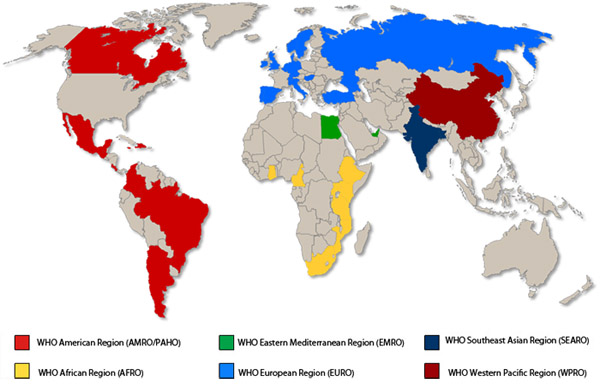Working Around the Globe
International support
We work with Ministries of Health and other global health partners in over 40 countries to support their efforts in fighting foodborne, waterborne, and mycotic (fungal) diseases. In 2011 alone, at the invitation of host countries, we provided training and critical technical assistance in the areas of surveillance, epidemiology, laboratory capacity building, and communications. We did this through temporary duty assignments from CDC headquarters and CDC regional and country offices, which included international experts in all World Health Organization (WHO) regions.

Global Water, Sanitation, and Hygiene (WASH): Safe Water System
CDC's Safe Water System (SWS) protects communities from contaminated water by promoting behavior change and providing affordable and sustainable solutions. The SWS increases access to safe water by helping individuals treat and safely store water in homes, health facilities, and schools. Safe Water System programs operate in over 30 countries around the world, treating 90 billion liters of water since 1998.
Global Health and Fungal Diseases
Fungal infections pose a serious threat to public health internationally. Opportunistic infections, such as aspergillosis, candidiasis, histoplasmsosis, and cryptococcosis [PDF - 2 pages], have emerged in and remain major problems for cancer patients, transplant recipients, and other immunocompromised individuals, including those with AIDS.
CDC experts in fungal disease and global AIDS, in partnership with other global experts, have worked with the World Health Organization (WHO) to create new guidelines [PDF - 44 pages] , released on December 7, 2011, to address the public health issues encountered in resource-limited settings, where the burden of cryptococcal disease is highest.
Global Foodborne Infections Network
Safe food is essential in maintaining a healthy and productive lifestyle. Foods can harbor harmful microorganisms that may cause serious human illnesses. The World Health Organization (WHO) defines foodborne illnesses as "diseases, usually either infectious or toxic in nature, caused by agents that enter the body through the ingestion of food" and estimates that each year two million people die from diarrheal diseases, mostly attributed to contaminated food and drinking water. The Global Foodborne Infections Network is collaboration between WHO, the Centers for Disease Control and Prevention, and other international public health organizations.
In 2011, GFN began working with partners in India to isolate the infections that are foodborne to defeat diarrheal diseases. The overarching goal is to work with partners to strengthen the food safety network throughout India and to the South Asia region by offering training to the key players in foodborne disease surveillance, sponsoring workshops to strengthen lab-based surveillance tailored to the specific needs of the region, and building state and national capacity for foodborne disease surveillance throughout the country and to the South Asia region.
Defeating diarrheal disease: Global Foodborne Infections Network in India [PDF - 2 pages]
PulseNet International
Foodborne illnesses can spread quickly and cause health and financial hardship anywhere the world. As a result of increasing international trade, food produced in one country may be consumed in a different part of the world and cause disease if contaminated with a foodborne pathogen. PulseNet International is a network of National and regional laboratory networks dedicated to tracking foodborne infections world-wide. Each laboratory utilizes standardized genotyping methods, sharing information in real-time.
International Collaboration on Enteric Disease 'Burden of Illness' Studies
The International Collaboration on Enteric Disease ‘Burden of Illness’ Studies (International Collaboration) was established in 2004. The purpose of the collaboration is to facilitate communication between individuals who have conducted or are interested in conducting studies to determine the burden of enteric or foodborne disease.
The collaboration is a forum for sharing information and technical advice on the design, implementation, and analysis of ‘burden of illness’ studies. It includes a moderated list-serv, a website, quarterly conference calls, and an annual meeting. Working groups have been established to facilitate our understanding of the global burden of disease and contribute to global burden of enteric disease estimates.
Global Health E-brief
For information about our work and other CDC programs working globally, CDC's Global Health E-Brief shares stories about the agency's work, in collaboration with diverse public and private partners, to improve global public health. 2011 Global Health E-Brief was designed to inform readers about key global health activities at the Center for Disease Control and Prevention (CDC).
One Year Later: Haiti Public Health System Rebounds with Help from US, Other Partners
One year after a 7.0 magnitude earthquake struck the island nation of Haiti; upwards of 1.5 million people continue to live in displaced persons camps while the country faces the added burden of a cholera crisis. CDC and a wide range of partners are helping Haiti reorganize, reconstruct, and restore systems to meet these enormous challenges. Haiti′s Ministry of Health requested CDC assistance in responding to control disease outbreaks. CDC has sent more than 277 technical staff to support public health in Haiti since the earthquake. Additionally, CDC and partners continue to work toward restoring the entire public health system that enables disease monitoring and response.
The 2011 Global Health E–brief highlights the health impact of this work in Haiti: CDC Global Health E-Brief, Haiti: One Year after the Earthquake 2011 [PDF- 9 pages].
Links to CDC global programs:
Contact Us:
- Centers for Disease Control and Prevention
1600 Clifton Rd
Atlanta, GA 30333 - 800-CDC-INFO
(800-232-4636)
TTY: (888) 232-6348
24 Hours/Every Day - cdcinfo@cdc.gov


